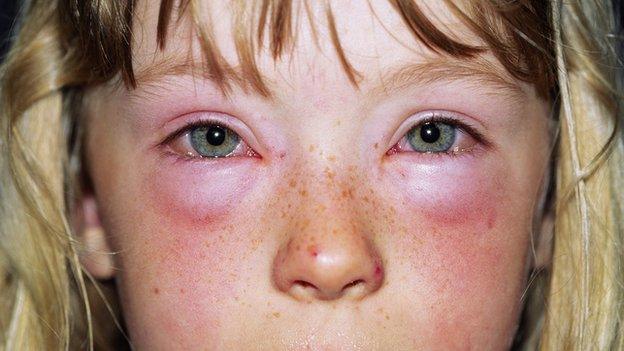Doctors' allergy mistakes 'risking lives'
- Published

Thousands of lives are put at risk by doctors prescribing drugs to which patients are known to be allergic, the medicines watchdog says.
The National Institute for Health and Care Excellence (NICE) said there were "major issues" in the way allergies were recorded and shared.
In its first guidelines on allergy, it is calling for known allergies to be recorded on all prescriptions.
The charity Allergy UK said a "lack of awareness" was putting lives at risk.
Official data recorded 18,079 incidents of drug allergies affecting patient safety in the NHS in England and Wales between 2005 and 2013.
Most involved medicines which were prescribed to a patient with a known allergy to that class of drugs.
Deadly
Prof Mark Baker, the director of the centre for clinical practice at NICE, said: "If we know that giving someone a particular drug could cause them harm, or in the worst instances may even kill them, the utmost care must be taken to ensure they are not prescribed or administered that drug."
NICE said efforts were needed to "dispel confusion" over allergies after "major issues" were discovered as the guidelines were drawn up.
It called for improvements in the way doctors collect information on patients' allergies. It also wants a re-design of all prescriptions to include information on the classes of drugs to which a patient is known to be allergic.

Antibiotics such as trimethoprim are a common source of allergies and can cause rashes and fever
Signs of allergy include fever, hives, wheezing, redness and swelling.
Dr Shuaib Nasser, a consultant allergist at Addenbrooke's Hospital in Cambridge, stated: "The guideline stresses the care all healthcare professionals must take when documenting new drug allergies and the importance of sharing this information with patients and other healthcare professionals.
"People should be provided with structured written information on drugs to avoid and be advised to check with their pharmacist before taking over-the-counter medicines.
"In some cases, specialist investigations will be required to confirm or exclude drug allergy."
Maureen Jenkins, clinical director at the charity Allergy UK, said: "Drug allergies can cause severe, sometimes life-threatening reactions but are often undiagnosed.
"We frequently have calls about the lack of awareness about drug allergy, inadequate documentation and communication between health professionals, which can put patients' lives at risk. We welcome these NICE guidelines, that will lay the foundation stone for better understanding and management of drug allergy across primary, secondary and tertiary care."